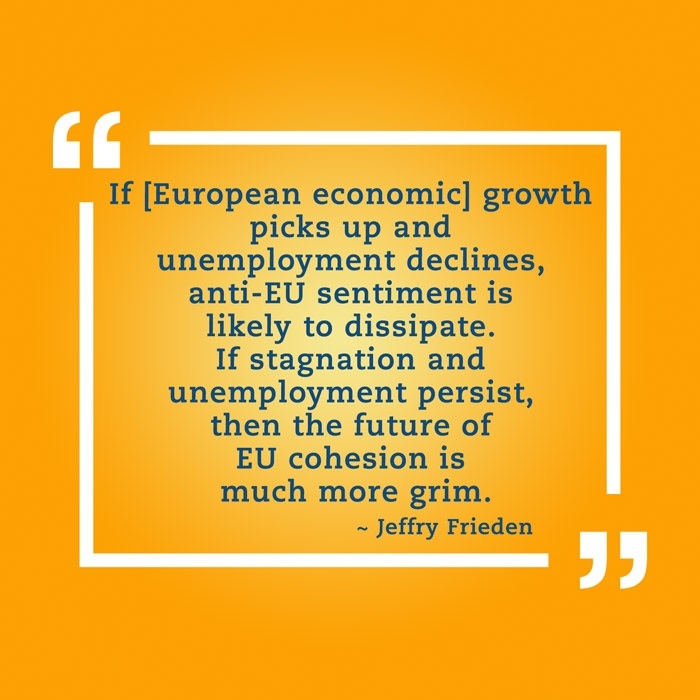Establishing political order in the UK and EU after historic Brexit vote

Second in a series on what Weatherhead Center scholars think about the unfolding institutional, political, and economic consequences of the June 23 United Kingdom referendum on European Union membership.
Disbelief from last month’s vote for Brexit lingers. Proponents of Britain’s continued EU membership want to revisit the decision. Some hope the British parliament will vote against implementing the referendum, or that the next prime minister will decide not to trigger Article 50 of the Treaty of Lisbon. Others suggest Scotland could refuse to consent to Brexit. There is also an online petition urging a second referendum, and there are calls for a general election.
These ideas are understandable given the uncertainties if Britain were to leave the European Union, but attempts to block that process could fuel the resentment felt by a large part of the British population who believe current policies do not meet their needs. One thorny problem with the June 23 referendum was the that it offered a choice between remaining in the European Union or leaving it for some unspecified, unknowable alternative.
Establishing political order in the UK is therefore a priority—the ship needs a rudder and a captain to plot a new course and navigate the rough waters ahead. Prime Minister David Cameron resigned and former London Mayor Boris Johnson will not be his successor as many had expected. Instead, the next prime minister will be a woman, Home Secretary Theresa May, who has been elected head of the Conservative Party. She is expected to take over as prime minister on July 13, making her Britain’s second female prime minister since the election of Margaret Thatcher in 1979.
With Europe’s leaders divided over how to negotiate Brexit, the labyrinthine process of disentangling Britain from the EU is daunting. Does Brexit set a precedent for Scotland and Northern Ireland to reexamine their respective political and economic arrangements? Will Brexit act like an accelerant or retardant for nationalist impulses in Austria, whose constitutional court ruled that its presidential election will be re-run in the fall? What concessions, if any, will the EU grant the UK on the terms of Brexit?
Harvard Professors and Weatherhead Center Faculty Associates Jeffry Frieden and Peter Hall shared their reactions to the referendum with the Weatherhead Center for International Affairs.
Q: There is some dispute over the mechanics of how the UK will leave the EU. Walk us through the timing of the major procedural steps.
Frieden: The UK has to activate Article 50 of the Treaty of Lisbon, asking to withdraw from the EU. David Cameron wants to delay this until the Conservative Party has a new leader, and the UK a new Prime Minister, which could mean delaying the start of the process until next year. But the other member states want to accelerate withdrawal. In any case, once the process is initiated, the EU and the UK will have to negotiate the terms of the withdrawal and, more important, the terms upon which the EU will interact with the UK in the future. At one extreme is the “Norway” option, by which the UK would remain a member of the single market but not a member of EU institutions. This is probably unacceptable to the UK, as it would mean accepting the free movement of people, and the principal selling point of the Leave campaign was its opposition to immigration. At the other extreme is the “WTO” option, by which the UK would be treated like any other country (e.g., the United States, Canada), hence excluded from any aspect of the single market. It is all to be decided, and nobody really knows what the final outcome will be.
Hall: Like everything else about Brexit, this is uncertain. The formal procedure under Article 50 requires the UK to first give notice that it intends to leave, followed by two years of negotiations about modalities, after which the UK is out regardless of the state of those negotiations unless the remaining twenty-seven member states consent unanimously to an extension.
The Conservative Party wants to delay giving this formal notice, at least until the fall. Some hope there can be negotiation and concessions that would keep the UK in the EU. Leading figures in the EU have reluctantly acceded to the fact that formal notice may not be given until December, but there is widespread sentiment that it would be foolish for the EU to give Britain major concessions to retain them in the Union lest this encourage other countries to try the same tactic.
Q: What are the viable long-term prospects for future European integration under Brexit? (Does Brexit increase the likelihood of another country leaving the EU? Of the UK splitting up?)
Frieden: A UK withdrawal would almost certainly lead to Scotland declaring its independence and applying for EU membership. How exactly this might take place is still under discussion, but it is practically unthinkable that Scotland would accompany England out of the EU. Northern Ireland is more complicated, due to its relationship with Ireland. In my view, the most likely outcome for Northern Ireland is independence (but not unification with Ireland), or else some form of extreme autonomy, sanctioned by the EU, that gives it special privileges and allows its borders with Ireland to remain open to the movement of goods, capital, and people.
There are several countries in which anti-EU sentiment is very strong—France, for example. The EU intends to make the terms of UK exit difficult enough to discourage further withdrawals, and my sense is that they will be successful in doing so. A lot depends on whether, and how, the European economy grows over the next few years. If growth picks up and unemployment declines, anti-EU sentiment is likely to dissipate. If stagnation and unemployment persist, then the future of EU cohesion is much more grim.
Hall: The British vote has encouraged Euroskeptical parties, especially in France and the Netherlands, to demand parallel votes. An opinion poll earlier this year suggested that only 52 percent of the French would vote to remain, so there is some momentum in this direction. But that would depend on those parties gaining control of a government since the current governments in the EU are determined to avoid a repeat. For that reason, they are unlikely to grant especially favorable terms to the UK.

Q: The initial analysis of the voting results from the EU referendum indicates a growing dissatisfaction with globalization and neoliberal governance. Your thoughts?
Frieden: Certainly the Leave voters were dissatisfied. We are not entirely sure about the principal source of dissatisfaction. Certainly immigration, and globalization more generally, were strongly criticized. But I feel that the most important source of discontent, and of support for the Leave campaign, came from a sense that neither the UK government, nor the institutions of the EU, had had any success addressing the serious economic problems of broad swaths of the working and middle classes. As in the US, the last twenty-five years in the UK have been very good to the wealthiest 25 percent or so of the population, but much of the middle and working classes have benefited little or not at all. I think that this is the core of the problem.
Hall: The British referendum is certainly another reflection of the ‘revolt against globalization’ we are seeing in Europe with the rise of radical right and left parties and in the US where support for Donald Trump is similarly motivated. Much of this is a protest vote by people who have not benefited much from the opening of global markets and technological change, fear the effects of immigration, and resent the fact that mainstream parties on both sides of the political spectrum have pursued broadly neoliberal policies that do nothing for them.
Q: Britain will now seek to forge new relationships with its European neighbors and the United States. What do you think are possible scenarios, and do such scenarios require the UK to accept free movement of peoples?
Frieden: The most “optimistic” scenarios, i.e., those involving the least disruption, would require the UK to accept the free movement of peoples within Europe, but this would be difficult or impossible given the nature of the Leave campaign. Beyond that, a reasonably optimistic scenario is one in which the UK leaves with minimal disruption and reestablishes cordial relations with the EU. A pessimistic scenario is one in which the UK economy falls into a deep recession, it loses many of its European customers and suppliers, and the UK declines rapidly.
Hall: At the moment, I think it very unlikely that the EU would grant the UK full access to the single market without requiring free movement of people. Those are the terms on which Norway and Switzerland have such access, although the EU will soon have to respond to a Swiss referendum in which the vote was to end such access. In five years time, especially if a Euroskeptic party takes control of a leading government, I can imagine the EU tightening the rules on free movement of people. They did offer the British minor concessions about the access of migrants to social benefits. But this issue strikes at the heart of the accomplishment of the EU and it is difficult to see how or why its officials would relent on it.
Q: The eurozone is not an “optimal currency area.” How important is this, and are there ways to overcome the structural dilemmas of operating a single currency in this economically diverse area?
Frieden: The euro can certainly endure without deeper political integration. However, it will require substantial changes in economic policy among the member states. A banking union is already being created, and that will help somewhat. The most important step forward would be some form of fiscal policy coordination to limit macroeconomic imbalances. If such a thing were in place today, it would force the Germans to run stimulative fiscal policies and to dramatically reduce its current account deficit. There is no German support for such things, though, so I think they are unlikely. Failing fiscal coordination, a strengthening of financial regulation in the context of the banking union may be enough to get the eurozone back on sounder footing. But it will be a struggle.
Hall: This issue is, of course, the subject of hundreds of thousands of pages of debate. I think the euro can probably endure but that the eurozone will prosper and weather future crises only if it secures a full banking union, cedes lender-of-last resort capabilities to the European central bank, and adopts some further means of risk sharing which might come in the form of eurobonds. Europe is gradually moving in these directions, albeit too gradually. In itself, that does not require much deeper political integration in the form of an ‘economic government’ for the EU, and that is good because there is no political appetite for such a move among European electorates.
—Amanda Pearson (@Pearson_ink), Communications Specialist, Weatherhead Center for International Affairs
Jeffry A. Frieden is the Stanfield Professor of International Peace at Harvard University and a Faculty Associate at the Weatherhead Center for International Affairs. He specializes in the politics of international monetary and financial relations, and his most recent book is Currency Politics: The Political Economy of Exchange Rate Policy (2015).
Peter A. Hall is the Krupp Foundation Professor of European Studies at Harvard University and a Faculty Associate at the Weatherhead Center for International Affairs. His recent analysis on Brexit appears in Foreign Affairs and the Washington Post's Monkey Cage.
Also in the series: Background to Brexit: One-Size-Fits-All Monetary Policy and the Eurozone Crisis.
This post was updated July 12, 2016 to reflect the news that Theresa May is the elected head of the Conservative Party.
